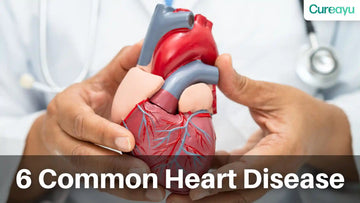Heartburn is a common ailment that affects numerous individuals across the globe. It is often perceived as a minor inconvenience, but for many, it can be a persistent and debilitating condition. Understanding the symptoms of heartburn is crucial for effective management and improved quality of life. This blog aims to shed light on the various symptoms associated with heartburn, its underlying causes, and offer practical suggestions on how to manage and treat this condition.
Recognizing the symptoms of heartburn early on can make a significant difference in how it impacts your daily life. By gaining insight into its causes and symptoms, you can take proactive steps to prevent and alleviate the discomfort it brings. Let's dive deeper into what heartburn is, the symptoms to watch out for, and how you can manage this condition effectively.
Also Read: A Comprehensive Guide on How to Prevent Heart Disease
What is Heartburn?
Heartburn is a burning sensation in the chest, just behind the breastbone, that usually occurs after eating. It is a symptom of acid reflux, where stomach acid travels back up the esophagus, leading to irritation and discomfort. While occasional heartburn is common and generally harmless, chronic heartburn can indicate more serious issues, such as gastroesophageal reflux disease (GERD).
The esophagus is equipped with a valve called the lower esophageal sphincter (LES), which opens to allow food into the stomach and closes to prevent acid from moving back up. When the LES doesn’t function properly, stomach acid can escape into the esophagus, causing the burning sensation associated with heartburn.
Heartburn Symptoms
Burning Sensation in the Chest
The hallmark symptom of heartburn is a burning sensation in the chest, typically felt behind the breastbone. This discomfort can range from mild to severe and may last from a few minutes to several hours. The burning often intensifies after eating, especially when lying down or bending over.
Regurgitation
Regurgitation involves the sensation of acid backing up into your throat or mouth, producing a sour or bitter taste. This can be accompanied by burping or a feeling of food re-entering your mouth, making it uncomfortable and unpleasant.
Difficulty Swallowing
Difficulty swallowing, also known as dysphagia, is a less common but significant symptom of heartburn. The irritation from stomach acid can cause the esophagus to become inflamed, making it painful or difficult to swallow food and liquids.
Chronic Cough or Sore Throat
A persistent cough or sore throat can also be a symptom of heartburn. The acid that reaches the throat can irritate the vocal cords and lead to a chronic cough or a sore, scratchy throat. This is often mistaken for other conditions like colds or allergies.
Hoarseness or Voice Changes
Exposure to stomach acid can cause damage to the vocal cords, leading to hoarseness or changes in your voice. If you notice your voice becoming constantly hoarse, it could be a sign of frequent acid reflux and heartburn.
Also Read: Protecting Your Heart: Essential Tips for Heart Health
Heartburn Causes
Diet and Lifestyle Choices
Certain foods and beverages can trigger heartburn. Fatty or fried foods, spicy dishes, citrus fruits, chocolate, caffeine, and alcohol are common culprits. Additionally, eating large meals or lying down immediately after eating can exacerbate the symptoms.
Obesity
Excess weight can put pressure on the abdomen, pushing stomach contents up into the esophagus. This increases the likelihood of experiencing heartburn. Maintaining a healthy weight can significantly reduce the risk and severity of heartburn.
Smoking
Smoking can weaken the LES, making it easier for stomach acid to escape into the esophagus. Quitting smoking is essential not only for overall health but also for reducing the frequency and severity of heartburn.
Pregnancy
Pregnant women are more prone to heartburn due to hormonal changes and the increased pressure on the stomach from the growing uterus. The symptoms often subside after childbirth, but managing diet and lifestyle during pregnancy can help alleviate discomfort.
What Is The Reason Behind Constant Heartburn?
Constant heartburn is often a sign of an underlying condition such as GERD. GERD occurs when the LES is weak or relaxes inappropriately, allowing stomach acid to flow back into the esophagus regularly. Other factors contributing to constant heartburn include hiatal hernia, where a part of the stomach pushes through the diaphragm, and certain medications that may relax the LES or irritate the esophagus. Chronic stress and a sedentary lifestyle can also exacerbate the symptoms.
Also Read: Boosting Your Immune System and Heart Health: A Holistic Approach
How To Treat Constant Heartburn
Dietary Changes
Avoiding trigger foods like acidic, spicy, or fatty meals can reduce the frequency and severity of heartburn. Incorporate more high-fiber foods, lean proteins, and whole grains into your diet. Eating smaller, more frequent meals can also help prevent overloading the stomach.
Lifestyle Modifications
Elevating the head of your bed, maintaining an upright posture after meals, and avoiding lying down immediately after eating can help prevent acid reflux. Additionally, wearing loose-fitting clothing can reduce pressure on your abdomen.
Medications
Over-the-counter antacids can provide quick relief by neutralizing stomach acid. H2 blockers and proton pump inhibitors (PPIs) reduce acid production and are beneficial for long-term management. Always consult your doctor before starting any medication regimen.
Stress Management
Implementing stress-reducing techniques such as mindfulness, yoga, or meditation can help manage heartburn symptoms. Chronic stress can exacerbate acid reflux by increasing stomach acid production and affecting digestive processes.
Quitting Smoking
As mentioned earlier, smoking weakens the LES. Quitting smoking not only improves overall health but also significantly reduces the incidence of heartburn.
Conclusion
Heartburn is more than just a minor inconvenience; it can severely impact your quality of life if not properly managed. Recognizing the symptoms early on and understanding the underlying causes are crucial steps towards effective management. By making dietary and lifestyle changes, incorporating stress-reducing techniques, and consulting healthcare professionals, you can alleviate the discomfort associated with heartburn.
Constant heartburn should not be ignored, as it may indicate more serious health issues like GERD. Taking proactive measures can prevent complications and improve overall digestive health. Remember, it’s always best to seek medical advice for persistent or severe symptoms to receive appropriate diagnosis and treatment. Empower yourself with knowledge and take the necessary steps to ensure a heartburn-free life for better overall well-being.












